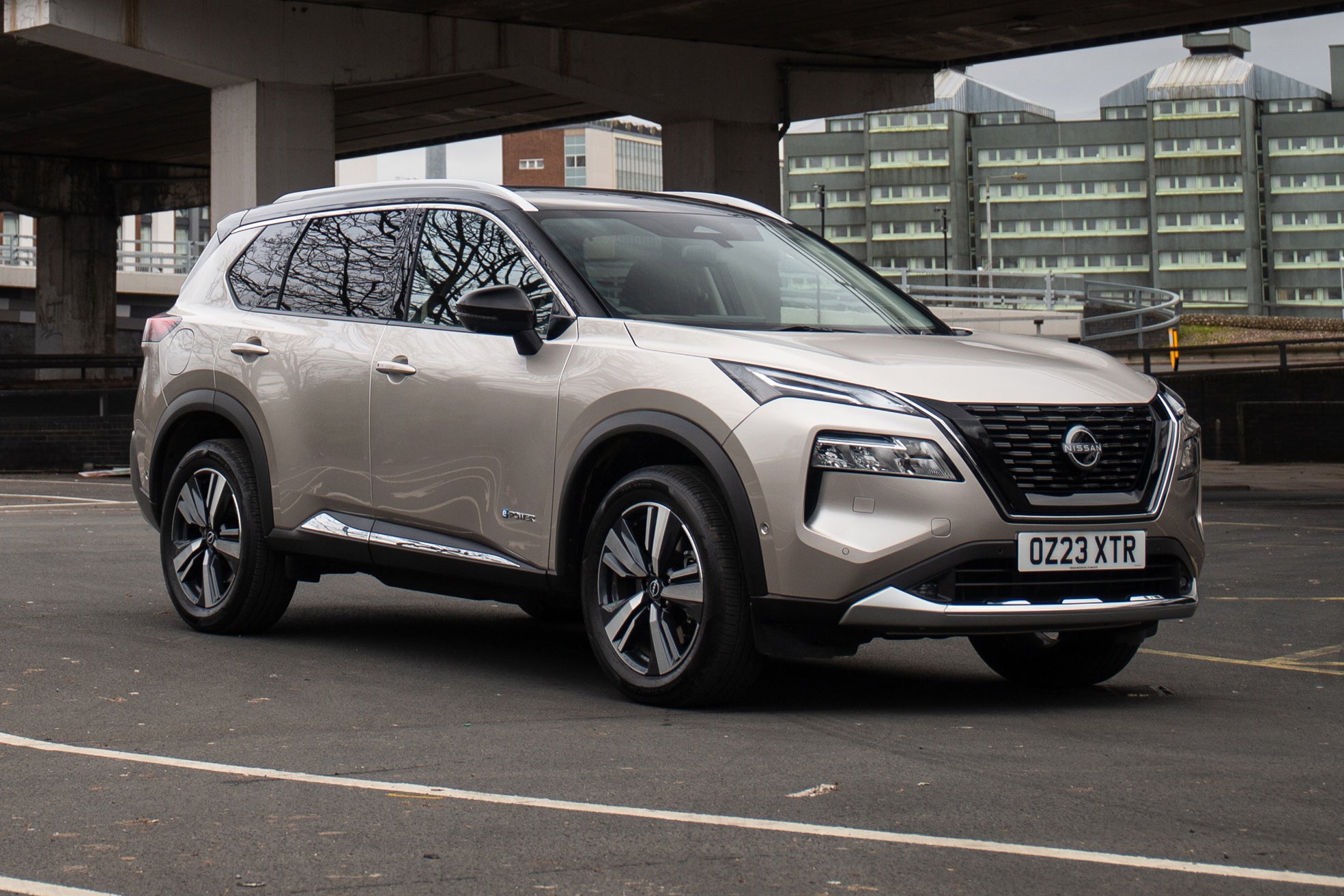Nissan X-Trail Review 2025: Price, specs & boot space
Written by Andrew Brady
Quick overview
Pros
- Rugged family SUV with interesting petrol-electric hybrid setup
- Modern interior that doesn't compromise on functionality
- Impressive driver-assistance tech as standard across the range
Cons
- Not the most versatile seven-seater
- Won't necessarily be that cheap to run
- The most desirable models are expensive
Overall verdict on the Nissan X-Trail
"The new Nissan X-Trail moves the game significantly compared to its staid predecessor. It looks and feels great, with a premium interior and genuinely innovative range of engines. Higher-spec models are expensive and a Skoda Kodiaq is beter in terms of practicality, but the Nissan X-Trail is now a very desirable family SUV."
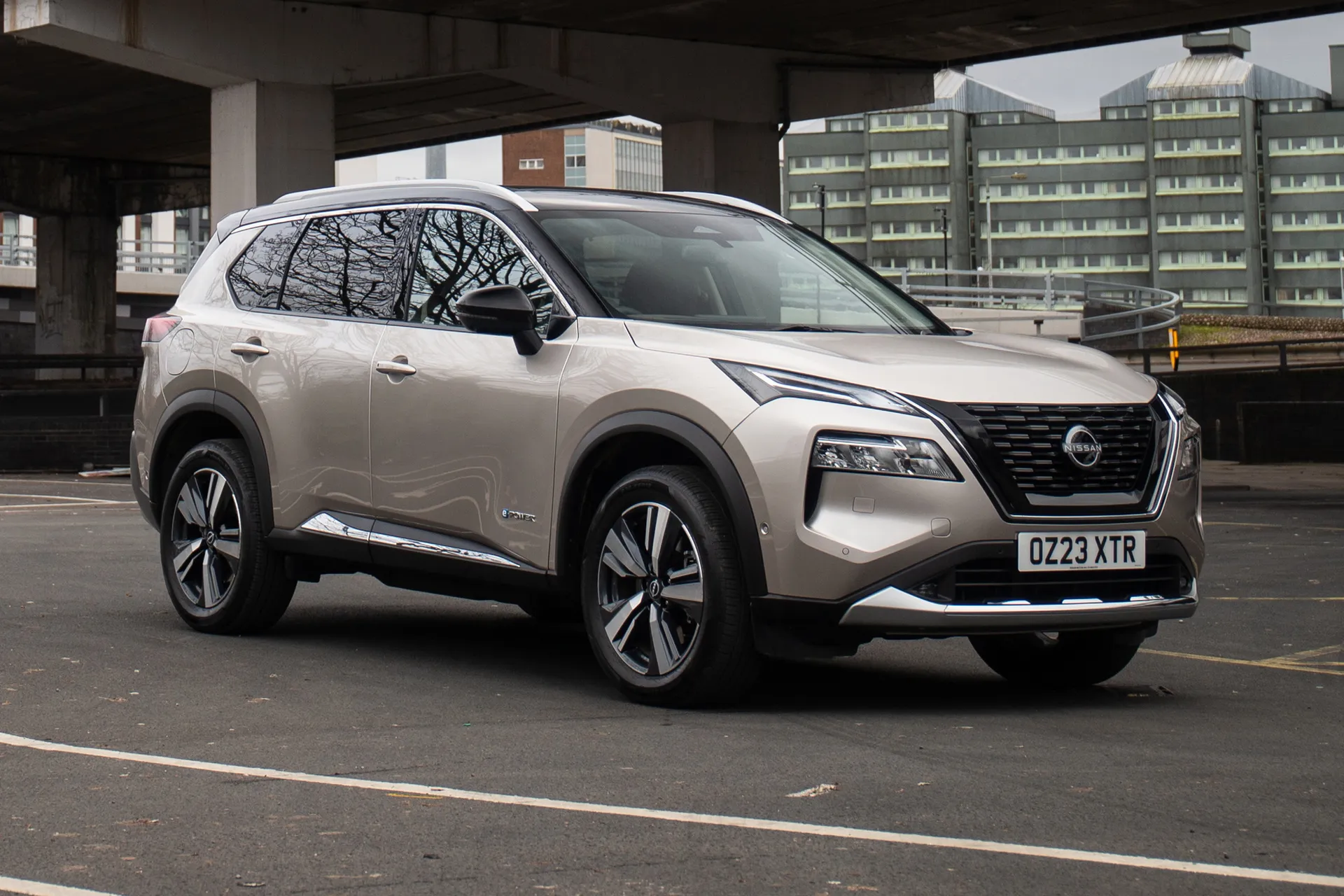
If you're not ready to swap your diesel SUV for an electric vehicle, the Nissan X-Trail reviewed here could represent the perfect compromise. That's because the Nissan X-Trail e-Power combines a little petrol engine with an electric motor (or two) to provide low running costs and electric-car-like refinement.
"But that's not new!", you might be shouting at this juncture. Hybrid SUVs are now pretty commonplace, with rivals including the Hyundai Santa Fe, Kia Sorento and Mazda CX-60 all available with a combination of petrol and electric power. The difference, though, is there's no direct link between the petrol engine in the Nissan X-Trail e-Power and the wheels. Instead, it acts like a generator, powering the electric motors and making the X-Trail feel more like an electric car (or at least a plug-in hybrid) to drive.
You don't have to charge the X-Trail yourself to ensure the best efficiency (the all-electric Nissan Ariya is a good alternative if that's what you want), while there's also a more affordable (and conventional) mild-hybrid Nissan X-Trail available if you're not entirely convinced. There definitely isn't a diesel X-Trail, though, and nor will there be: look at the Skoda Kodiaq if you need the long-distance, fuel-sipping abilities of a diesel and don't mind being glared at on the school run.
Technical gubbins aside, what's the new Nissan X-Trail like? Well, for a start, its cabin is much posher than before. While we haven't tried an X-Trail N-Connecta, our Tekna test car (with its panoramic sunroof, power tailgate and huge infotainment screen) felt on a par with pricier premium SUVs. The Nissan X-Trail Tekna+ is even posher, with quilted leather seats and a fancy Bose sound system.
That doesn't come at the expense of usability, either. From the chunky buttons for the climate control to the extra storage space under the centre console, the Nissan X-Trail has definitely been designed by people who understand the needs of growing families. You can even get the X-Trail with an extra pair of seats. While we wouldn't class it as a true seven-seater, they might save your bacon on those occasions when your child wants to bring a friend or two home from school.
We suspect the Nissan X-Trail will remain a relatively niche choice in the SUV market (certainly compared to the smaller and universally popular Nissan Qashqai). There are rivals that are more efficient, more spacious and better to drive, but the X-Trail is a very competent all-rounder that's much more desirable than its predecessor.
Looking for a used car for sale? We've got 100s of Nissan Approved Used Cars for Sale for you to choose from, including a wide range of Nissan X-Trails for sale. If you're looking for the older version, you need our Nissan X-Trail (2013-2022) review.
Is the Nissan X-Trail right for you?
If you're looking for a rugged family SUV that'll cope well with being loaded with pushchairs, children's bikes and maybe even have room for granny and grandad, the Nissan X-Trail makes for an interesting choice alongside mainstream competitors like the Skoda Kodiaq. We like the e-Power setup but it won't suit everyone: a diesel SUV will still make more sense for regular long-distance drivers. At least you don't have to charge it, though.
What’s the best Nissan X-Trail model/engine to choose?
The Nissan X-Trail e-Power, with its innovative petrol-electric powertrain, is the big seller, and it's the one we'd go for. Not only will it be cheap to run, it's also extremely refined and provides a welcome boost in performance over the entry-level mild-hybrid model.
There's no shortage of trim levels to choose from. We'd dismiss the entry-level Nissan X-Trail Visia (Nissan eventually discontinued this version anyway) unless you're on a strict budget; the Nissan X-Trail Acenta Premium is a more appealing choice, if only for its eight-inch media system with Apple CarPlay/Android Auto. It's worth stretching to the mid-spec N-Connecta for the bigger 12.3-inch infotainment display as well as some nice-to-have features like the privacy glass, interior ambient lighting and 360-degree parking camera.
Top-spec X-Trail Tekna and Tekna+ models are desirable but harder to justify: you can spend well over £40,000 on a new one, and that's straying into premium SUV territory (with the annual VED bill to match).
What other cars are similar to the Nissan X-Trail?
If you're in the market for a practical family SUV, we'd recommend the latest Hyundai Santa Fe and Kia Sorento. Both are big family cars with loads of space and lots of kit for your money, although they aren't cheap.
The Land Rover Discovery Sport is a good alternative, particularly if a premium badge appeals (or you actually wish to venture off road), while the Skoda Kodiaq is hard to beat in terms of value for money. You should also look at the Volkswagen Tiguan Allspace (basically a posher Kodiaq) and the SEAT Tarraco (a sportier Kodiaq).
The new Mazda CX-60 is a slightly left-field choice with a very efficient plug-in hybrid powertrain, while the Toyota Highlander is a pricier SUV with low running costs and an exceptional reliability record. The Peugeot 5008 is a solid contender, too, while the Honda CR-V is also worth a look.
Comfort and design: Nissan X-Trail interior
"We loved the tan leather interior of our X-Trail test car, but a spokesperson told us the majority of buyers will go for a more sensible, darker-coloured interior. At least the option's there, though, and the cabin is much more pleasing on the eye than the drab interior of the old model."
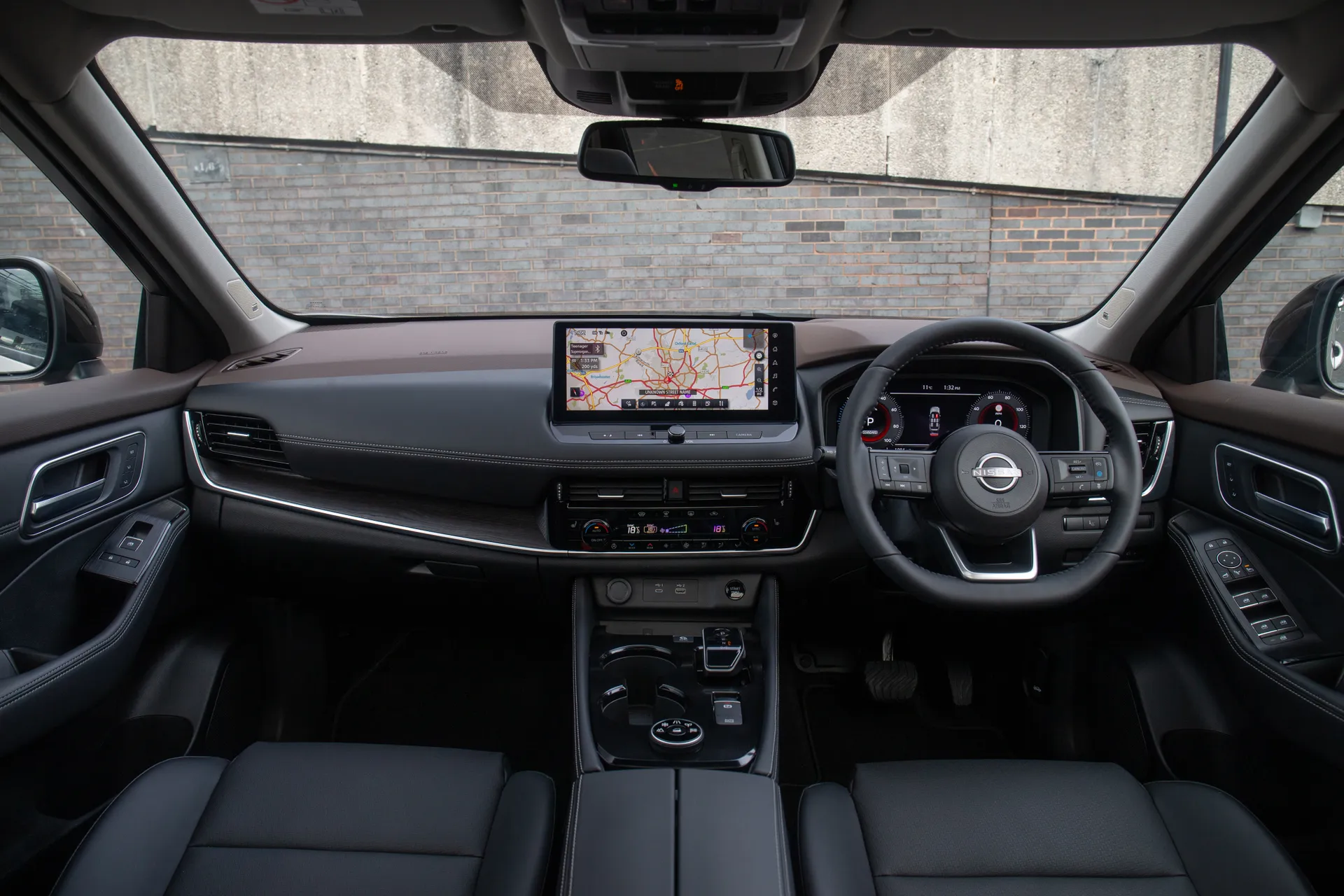
A widescreen infotainment display dominates the dashboard of higher-spec models, along with a premium digital instrument cluster behind the steering wheel. Refreshingly, though, Nissan hasn't gone down the minimalist route with its approach: you still get buttons and knobs for turning on your heated seats, tweaking the temperature of the climate control or turning up the volume of the radio. You'll be very appreciative of this when you're wearing gloves on a winter's day or just want to crank up your tunes when it's late at night.
The seats are comfortable and supportive, and positioned high up like in a proper SUV (unlike in many smaller crossovers like the Nissan Qashqai). Most X-Trail models come with adjustable lumbar support for the driver but you'll need a high-spec Tekna or Tekna+ model for electronic adjustment.
Ambient interior lighting adds to the premium vibe of the pricier X-Trail models. We suspect it'll be a very spec-dependant car, though: we haven't tried an entry-level Nissan X-Trail Visia, but its spec list makes for pretty grim reading: you get a basic DAB radio, manual air conditioning, cloth seats, a leather steering wheel and not a lot else. No wonder it was later canned.
Quality and finish
The Nissan X-Trail might be a rugged SUV but it feels pretty plush inside, particularly high-spec models with their quilted leather seats. Sure, you'll find a few hard plastics further down in the cabin, but they should do a good job of deflecting muddy feet. The doors close with a satisfying 'thunk' and we didn't notice any rattles or irritating noises after a day or two of testing the X-Trail on challenging Slovenian roads.
Infotainment: Touchscreen, USB, nav and stereo in the Nissan X-Trail
If you want the fancy dual-screen infotainment setup featured in our pictures, you'll need a Nissan X-Trail N-Connecta, N-Trek, Tekna or Tekna+ model. It's the same system as used in the Nissan Ariya and we liked it there, save for a few below-par graphics. Apple CarPlay and Android Auto are standard, allowing you to bypass Nissan's software and use your favourite smartphone apps. While CarPlay is wireless in the X-Trail, you'll have to plug your Android phone in, unfortunately.
The 12.3-inch digital instrument cluster is clear to read and looks sufficiently premium, while the Tekna and Tekna+ come with an additional 10.8-inch head-up display, which projects your current speed onto the windscreen. This is definitely a 'nice to have', but it's difficult to justify the extra cost over mid-range models on its own.
The Nissan X-Trail Acenta Premium comes with a smaller 8.0-inch screen that we're yet to sample, while the entry-level Visia trim level doesn't even come with that - you get a DAB radio with Bluetooth and four speakers... and that's about it.
Space and practicality: Nissan X-Trail boot space
Space is important in a family SUV like this, but the X-Trail could be more competitive. The Nissan X-Trail's boot capacity is 585 litres: up 20 litres compared to the old model, but significantly less than a five-seat Skoda Kodiaq (which can swallow 910 litres of your prized possessions). Access is pretty good, though, and we found it to be a useful shape for loading suitcases.
You can buy the Nissan X-Trail with an extra pair of seats in the boot. With these in use you don't get much in the way of luggage space at all, while they're not the easiest seats to actually get in and out of. Children will enjoy the challenge and it might be nice to have the option there for the occasional oversubscribed school run, but we'd recommend looking for an MPV alternative if you need a true seven-seater.
Access to the second row of seats is much easier, thanks to doors that open nearly 90 degrees. You get three individual seats, which should help prevent silly squabbles, and they'll even slide backwards and forwards by up to 22cm on most models, meaning you can prioritise the space where you need it. Top-end models come with a panoramic sunroof which adds to the feeling of space (and help prevent motion sickness), while useful features like the in-built sun blinds on the side windows will come in beneficial.
You'll find loads of space in the front, while the high seats give a good view of the road ahead, and make getting in and out easy. There's a floating centre console with some useful storage space underneath, along with huge door bins and a generous glove box.
Unusually, the Nissan X-Trail hasn’t grown much on the outside. It’s actually 10mm shorter than the old one, and has gained 20mm in width and 15mm in height. This means it measures just under 4.7 metres long, 1.85 metres wide and around 1.72 metres tall.
Handling and ride quality: What is the Nissan X-Trail like to drive?
"We seem to be moving away from the trend for SUVs with huge alloy wheels and rock-hard suspension. Just like the Citroen C5 Aircross and Skoda Kodiaq, the Nissan X-Trail is softly sprung, which is good news on uneven road surfaces."
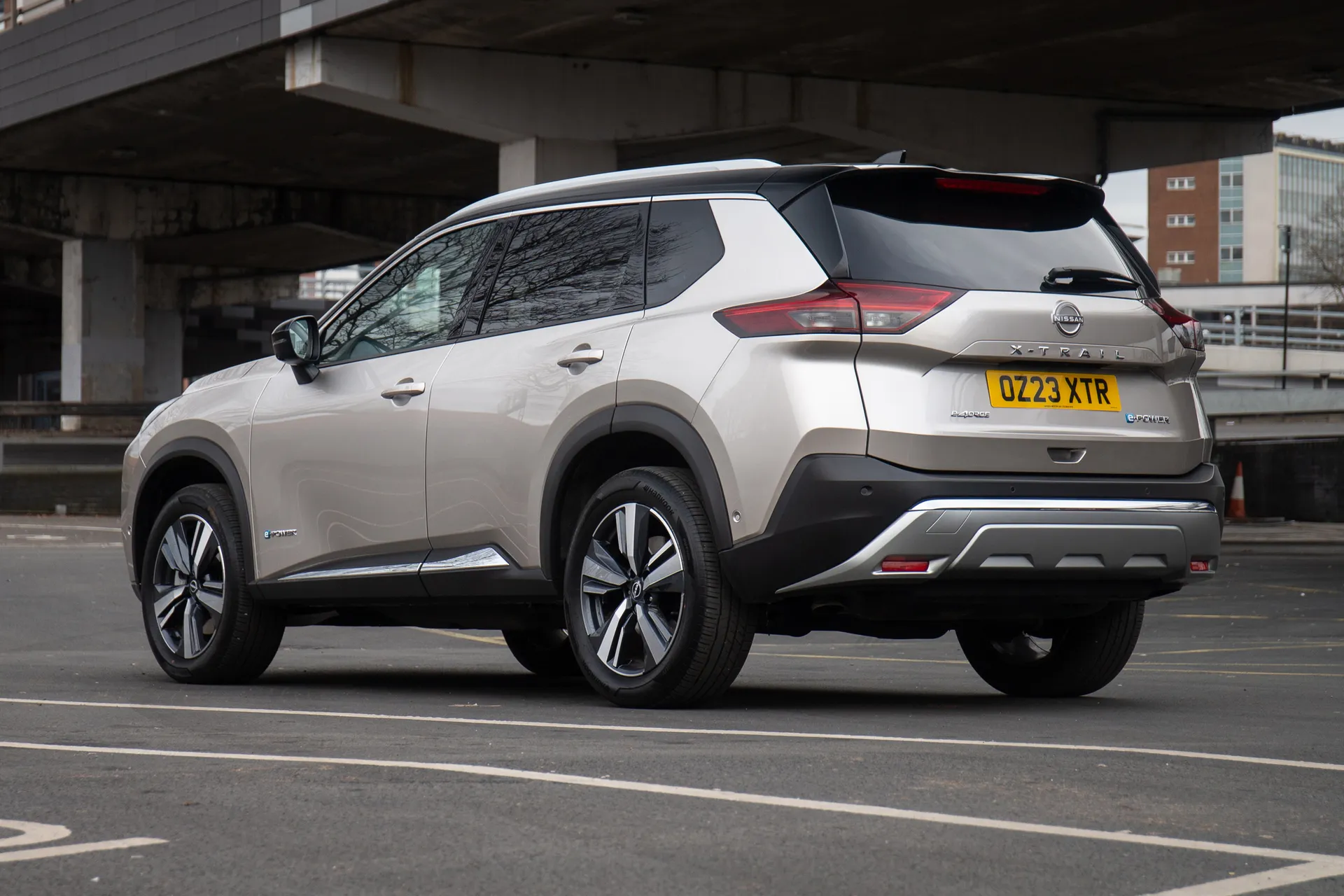
Even on the 20-inch alloy wheels of our test car, the Nissan X-Trail crashes over bumps much less than a Mazda CX-60. We suspect the lower-spec models, with their 18-inch wheels, will ride like the proverbial magic carpet.
Does that come at the expense of handling? Yes and no. It depends on your expectations of a family SUV, really: if you want one that's entertaining to drive, you might need to look at the BMW X3 instead. But the Nissan X-Trail feels safe and unintimidating, with plenty of grip and impressive body control (meaning your passengers won't be swayed around too much during cornering).
You can buy a Nissan X-Trail e-Power with four-wheel drive. This is badged the e-4orce and it uses an extra electric motor powering the rear axle. This setup can shift torque between the wheels 10,000 times faster than an old-fashioned mechanical system, says Nissan, giving you a welcome confidence boost in slippery conditions such as snow. We tried it on gravel and it certainly did a commendable job of following our intended line, while it also made light work of a reasonably challenging off-road course.
What engines and gearboxes are available in the Nissan X-Trail?
The Nissan X-Trail range kicks off with a 1.5-litre turbo petrol engine. Although this gets a small amount of electrical assistance (enough to class it as a mild-hybrid), you're not going to travel any significant distance under electric power. The best you can hope for is that the car's engine will switch off as you coast to a stop at traffic lights.
With 163PS, the mild-hybrid Nissan X-Trail will accelerate to 62mph in around 9.6 seconds, which makes it competitive against a 1.5-litre petrol Skoda Kodiaq. If you're used to a grunty diesel engine or regularly drive with a car full of passengers, it might feel a bit underwhelming in terms of performance, though.
The majority of Nissan X-Trail buyers are expected to go for the innovative e-Power setup. This uses the same 1.5-litre petrol engine but it doesn't actually drive the wheels. Instead, it acts as a generator for an electric motor (or two, depending on which version you choose).
The idea, says Nissan, is that you get all the benefits of an electric car (instant acceleration and impressive refinement, to name a few) but without the need to plug it in. Ever.
With 204PS, it'll accelerate to 62mph in 8.0 seconds flat, which will make motorway sliproads feel like less effort than the standard 1.5-litre petrol. It's quite an impressive system, similar to a plug-in hybrid in many ways but with the convenience of a conventional self-charging hybrid.
While most Nissan X-Trail models are two-wheel drive, the Nissan X-Trail e-4orce 4WD brings with it a minor power boost, while extra traction takes the X-Trail to 62mph in a fairly swift 7.0 seconds.
Refinement and noise levels
Nissan claims that, at 25mph, the X-Trail's cabin is around 8dB quieter than those of competitors. We haven't been able to substantiate that figure, but it certainly feels pretty hushed when you're bimbling about town. The e-Power model sets off under electric power, with the petrol engine only chiming in when you're a bit heavy handed with the accelerator pedal. A plug-in hybrid (or pure-electric) alternative will be quieter, but the X-Trail e-Power is generally a relaxed companion.
Even at motorway speeds, the Nissan X-Trail is pleasantly quiet. You can't hear much noise from the suspension or a great deal of roar from the tyres, while the X-Trail does an impressive job of suppressing wind noise considering its blocky shape.
Safety equipment: How safe is the Nissan X-Trail?
Nissan offers a comprehensive suite of driver-assistance tech and, pleasingly, it's fitted as standard to the entire X-Trail range. That means you get things like an intelligent front emergency braking system, which can detect other cars, pedestrians and cyclists, and apply the brakes automatically if it thinks there's going to be a collision. You also get intelligent rear automatic braking (which does the same in reverse) and intelligent blind spot intervention, which will nudge you back into your lane if you start to stray with another vehicle in your blind spot.
The Nissan X-Trail has been awarded a full five stars for safety following independent crash tests by Euro NCAP.
MPG and fuel costs: What does a Nissan X-Trail cost to run?
"While the Nissan X-Trail e-Power isn't as frugal as plug-in hybrids on paper, it ought to be pretty efficient in the real world. According to WLTP fuel economy tests it can return up to 49mpg, while speccing one with four-wheel drive or the third row of seats does have a small impact on economy."
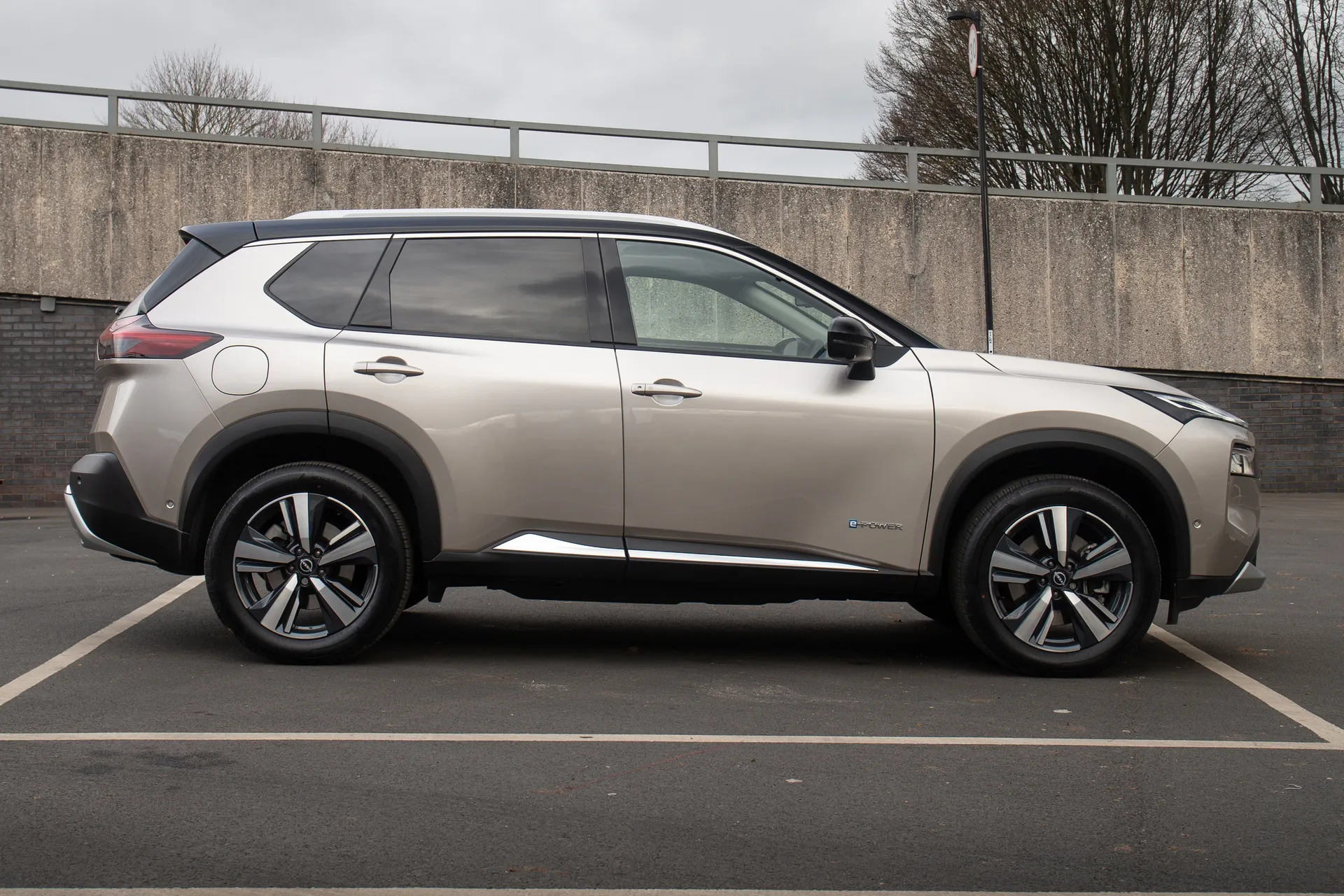
The extra weight of the e-4orce four-wheel-drive system sees fuel economy drop to 45mpg: not a huge difference, but significant enough to make you question whether you really need a 4x4.
The mild-hybrid engines are less efficient, returning around 39mpg regardless of whether you spec the car with five seats or as a seven-seater. You might see even less than this in reality: the X-Trail is a big, heavy SUV after all, and the little 1.5-litre mild-hybrid petrol engine would need working hard to shift the car when loaded up.
If you're planning on covering a lot of long-distance motorway miles, you might want to look at a fuel-sipping diesel SUV alternative instead. A 1.5-litre diesel Peugeot 5008 returns up to 60.8mpg (57.8mpg with the automatic transmission), which could make quite a significant difference to the overall running costs.
How reliable is the Nissan X-Trail?
Nissan has a slightly mediocre reliability record, ranking 19th out of 29 manufacturers in the latest HonestJohn.co.uk Satisfaction Index. That said, it has plenty of experience building electric vehicles, which should stand its e-Power drivetrain in good stead. The latest Nissan X-Trail shares its platform with the popular Nissan Qashqai and we've heard very few reports of issues with that, so the X-Trail ought to be a pretty dependable choice.
Insurance groups and costs
The cheapest Nissan X-Trail models to insure will be the more basic trim levels with the mild-hybrid drivetrain. These have been placed in insurance groups 21 or 22, which means they shouldn't be overly expensive to insure (provided you're not a new driver, anyway).
High-spec Nissan X-Trails with the e-Power setup will be a little more to insure, with the top-spec X-Trail Tekna+ e-Power placed in insurance group 31. This reflects the extra performance on offer, but it still shouldn't be a deal breaker (depending on factors like your age, location and driving experience).
VED car tax: What is the annual road tax on a Nissan X-Trail?
All Nissan X-Trails are powered by 'alternative fuel' in the eyes of the authorities, so (after the first year) you'll pay £180/year in tax. That's a saving of £10 a year. If you want free road tax, you'll need to look at a pure-electric alternative like the Nissan Ariya.
If you're tempted by a mid- to high-spec Nissan X-Trail, you're in danger of being stung by the government's premium car tax. This applies to all cars with a list price of more than £40,000 when brand new, including options (even if you buy secondhand and don't actually pay that). This adds an extra £390 to the annual bill for five years (from the second time the car is taxed).
How much should you be paying for a used Nissan X-Trail?
"With a price tag starting in the region of £35,000, the Nissan X-Trail looks like reasonably good value alongside competitors including the Skoda Kodiaq, Kia Sorento and Hyundai Santa Fe."
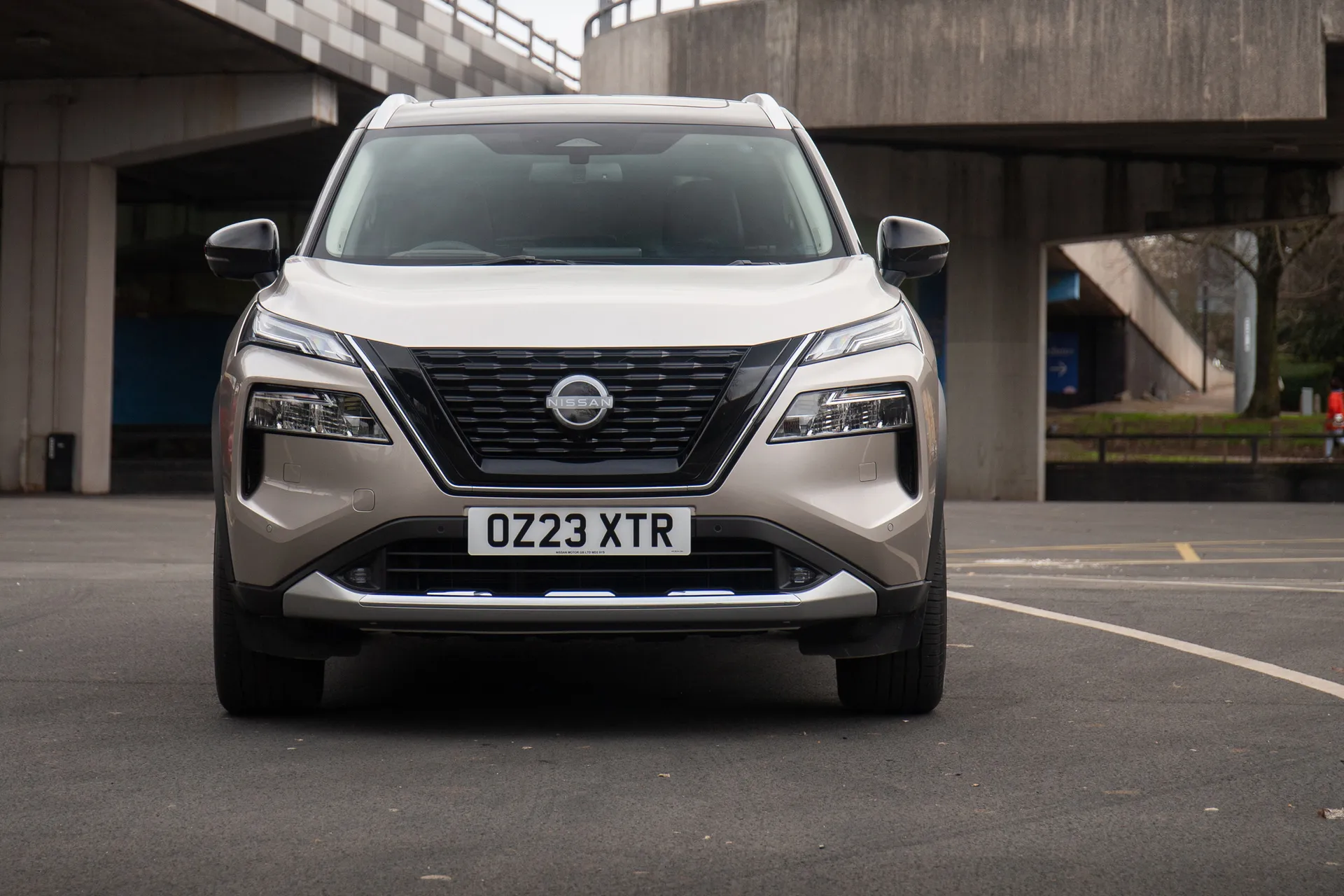
Thats for a car with the entry-level mild hybrid powertrain. You'll pay another £2,500 for the two-wheel-drive e-Power, and another £2,500 again for the e4orce 4WD version.
The mid-spec X-Trail N-Connecta starts from around £38,000 when new, while the high-spec Nissan X-Trail Tekna and Tekna+ are priced from around £41,000 and £43,000 respectively.
Fortunately you can make your money go further by looking for a used Nissan X-Trail. On the heycar classifieds, prices begin at around £26,000, which is a very useful saving, and both the mild hybrid and ePower hybrids are available for that money. None of them have crazy mileages, either.
Trim levels and standard equipment
The Nissan X-Trail Visia comes with 18-inch diamond cut alloy wheels, LED lights (front and rear), rear parking sensors, a seven-inch TFT driver's display, intelligent cruise control and intelligent front emergency braking with pedestrian, cyclist and junction assist.
The Nissan X-Trail Acenta Premium (this later became the entry-level trim when Visia was dropped) adds front parking sensors, a reversing camera, an eight-inch infotainment display with six speakers, wireless Apple CarPlay/wired Android Auto and two-zone air conditioning.
The Nissan X-Trail N-Connecta builds on this with roof rails, privacy glass, a 12.3-inch digital driver's display, a 12.3-inch infotainment display with Apple CarPlay and Android Auto, Nissan's around-view monitor with moving object detection and ambient lighting on the centre console. The outdoorsy N-Trek trim is based on N-Connecta, but adds more rugged exterior styling, water resistant upholstery, tri-zone air-con and heated for the steering wheel and middle row of seats.
Highlights of the Nissan X-Trail Tekna include 19-inch diamond-cut alloy wheels, a panoramic sunroof, electric tailgate, ProPilot Assist with Navi-Link, a 10.8-inch head-up display and wireless phone charger. Later on in the car's life, half that stuff got added to N-Connecta trim.
The top-of-the-range Nissan X-Trail Tekna+ comes with 20-inch diamond-cut alloy wheels, a premium Bose sound system with 10 speakers and quilted leather seats.
Ask the heycar experts: common questions
Is the Nissan X-Trail a five- or seven-seater?
How much is the new Nissan X-Trail?
Is the Nissan X-Trail good on fuel?
Get our latest advice, news and offers
Keep me updated by email with the latest advice, news and offers from heycar.
By submitting you agree to our privacy policy
